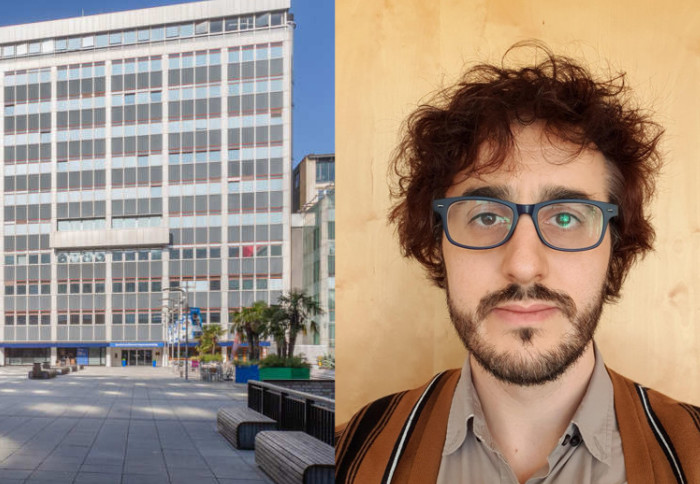Electrical and Electronic Engineering welcomes a new Lecturer
by Jane Horrell

Dr Adam "Ad" Spiers brings experience in robot hardware design that will provide opportunities for collaborative research and creative teaching.
Ad completed his PhD at the Bristol Robotics Laboratory. He has worked at Yale University and most recently at the Max Planck Institute for Intelligent Systems in Stuttgart. As a Lecturer in our department, his expertise will complement our current research in human-centred robotics, and offers great potential to the teaching curriculum, including exciting student projects.
Ad’s research is focused on movement and sensing in natural and artificial hand/arm systems, such as the development of dexterous robotic hands.

A major feature of his work is the design of haptic technology — communication through touch-based interfaces. For example, this shape-changing hand-held device (below), which can help pedestrians use navigation systems like Google Maps, without relying on visual or audio cues.

Ad's work has also involved improving the design of artificial limbs by understanding how people use existing prosthetic devices. “In addition to lab-based motion capture experiments, I led a novel study where we used head-worn GoPro cameras to record videos of unilateral amputees’ hands and prosthetic devices as they performed many hours of self-selected household tasks in their own homes.”
Outside of research, he is having an exciting year: “In my spare time I produce electronic music and DJ at various events and locations; this year I had my first song released via a record label. I’m doing less musical activity at the moment as I became a father in June, which is also extremely exciting.”
“I’m very much looking forward to being a member of a vibrant university with a reputation for world-class teaching and research, and being involved with the Imperial Robotics Forum, an extremely impressive collection of research groups that spans many departments and specialties.”
Hands-on teaching
Like many of us in EEE, Ad has loved machines and robots since childhood, and is really looking forward to teaching. As well as planning future research-led student projects involving robotics, haptics and human motion capture, he is already involved in developing engaging lab exercises and challenges for our new MSc in Applied Machine Learning which starts in October.
“I aim to set practically-grounded technical projects where creativity and innovation are rewarded. My own final year project was my favourite part of my degree, and subsequently led to my passion for research in disruptive technologies.”
Welcome to the EEE Community Ad — we look forward to meeting you!
Article text (excluding photos or graphics) © Imperial College London.
Photos and graphics subject to third party copyright used with permission or © Imperial College London.
Reporter
Jane Horrell
Department of Electrical and Electronic Engineering